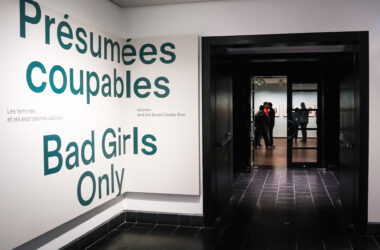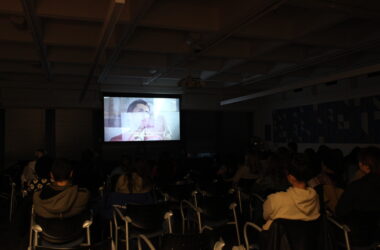According to the McGill University Safety Report for 2015-2016, there were only two cases of sexual assault on both the downtown and MacDonald campuses combined. This is a mere fraction of the reported safety incidents on campus. However, Sexual Assault Statistics in Canada reported that only six assaults for every 100 are reported. And unfortunately, it’s understandable why these statistics are so disheartening. Looking at recent events at Canadian universities like Western or Queen’s,
sexual violence cases are, as mentioned numerous times by the play’s narrator—too often cases of “her word against his”—creating an atmosphere of distrust surrounding issues of consent. This statement is repeated throughout Persephone Bound, a play and panel discussion put on by The Office for Sexual Violence Response, Support and Education (O-SVRSE) on Oct. 5.
The narrative aerial performance serves as an entry point into a sensitive subject. Telling the story of a young college freshman, the performer and playwright Léda Davies used ropes to display her interpretation of a modern Persephone. Davies took inspiration from the Greek myth of Persephone, in which Persephone’s abduction is witnessed by many people—including her father Zeus—but they all choose to remain silent so as to not cause tension or conflict. This reasoning is frighteningly similar to how many people continue to turn a blind eye to sexual assaults. It reminds us that despite the myth being written in approximately the seventh century BC, the issue of consent is even more relevant today.
Persephone Bound explores the myriad of emotions, questions, and trauma that survivors of sexual assault experience. Coming forward with disclosures of assault is a monumental obstacle in itself. Yet—as explained in the discussion panel post-performance—legal and social systems consistently fail in supporting survivors. The process of having a sexual assault case pass through the court system takes approximately three years from initiation to completion, with the survivor constantly having to relive their trauma.
Davies has performed in theatre, dance, and circus for over 10 years, and has lived in Montreal since 2013. Co-writing Persephone Bound, Jed Tomlinson works as a freelance actor, clown, drummer, and theatre artist. By introducing various perspectives around sexual consent, both playwrights hope to cultivate a dialogue surrounding sexual violence, reporting the assaults, and providing resources. The narrative performance jumped from the past to present, re-enacting the sexual assault itself, then following Persephone as she is interrogated. Intrusive questions such as how many times Persephone peed that evening, or what she was wearing at the party, allowed the audience to see the doubt survivors face as they are forced to relive their trauma through rape kits and interviews.
The panel discussion shed light on the realities experienced by survivors of sexual violence. The panel of four experts—including performer Léda Davies—explored many aspects surrounding consent, including the specific science behind how trauma affects the brain. The panelists examined how identity, social status, and sexual orientation can cause differences between the stories of survivors. They acknowledged that the play’s character Persephone, a white middle-class heterosexual who attends a college party, is a narrow glimpse into the multifaceted ways in which sexual violence affects survivors’ lived experiences.
As a concluding event for this year’s fourth annual #ConsentMcGill Campaign, Persephone Bound allowed for an inclusive and open discussion surrounding sexual consent. The O-SVRSE has been serving the McGill community since November 2016, and aims to provide students, faculty, and staff impacted by sexual violence with crisis and reporting support.
For more information, visit mcgill.ca/osvrse.








